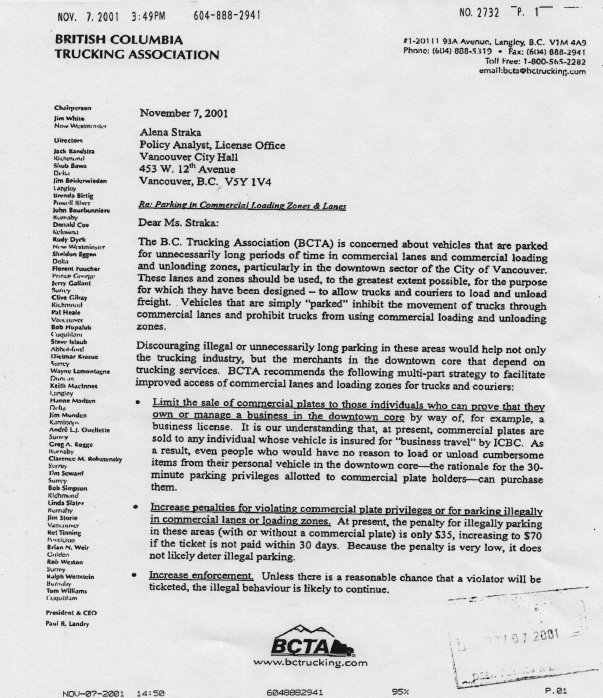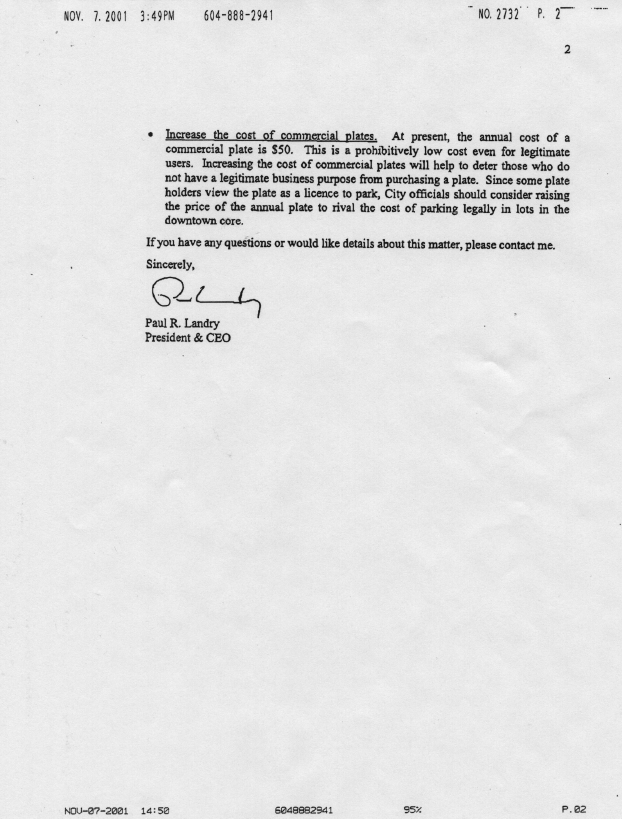

 |

|
ADMINISTRATIVE REPORT
Date: November 8, 2001
Author/Local:R.G. Macdonald/
7347
RTS No. 02368
CC File No. 2501
CS&B: November 22, 2001
TO:
Standing Committee on City Services and Budgets
FROM:
General Manager of Engineering Services and Chief License Inspector
SUBJECT:
Review of Commercial Vehicle Permits
RECOMMENDATION
A. THAT section 19.2 of the Street and Traffic By-law No. 2849 be amended, as set out in the report, to better define the signage identification requirements for a commercial vehicle;
B. THAT section 21.6 of the Street and Traffic By-law 2849 be amended to remove the requirement for a vehicle with a commercial permit to display a removable sign identifying the owner/operator and allow the City to issue the annual commercial permit in the form of either a metal plate or decal;
C. THAT the fee for the commercial permit be increased by $50 per year in 2002, 2003 and 2004, which would result in a fee of $200 in 2004;
D. THAT staff report back on any revisions to enforcement levels that may be needed to address the change to the issuance of commercial permits; and
E. THAT the Director of Legal Services be requested to prepare the necessary amendments to the Street and Traffic By-law.
POLICY
Council approves amendments and additions to the Street and Traffic By-Law.
On January 17, 1991, Council resolved that fees should be set to ensure full cost recovery, or that fees are equivalent to competitive charges where the fee is of a market nature.
PURPOSE
This report reviews the regulations for commercial vehicles and recommends changes in vehicle signing requirements and permit fees.
BACKGROUND
Commercially licensed vehicles are given special permission in the City's Street and Traffic By-law to facilitate goods movement and loading. They have the exclusive right to stop in lanes abutting commercial premises, and zones identified for commercial vehicle use. They also are allowed to use parking meters without payment before 10:00 am. and passenger zones before 12:00 noon for 30 minutes while actively loading.
The following are two ways that a commercial vehicle may be identified in Vancouver:
1. A vehicle can display a Municipal Decal. This is a Provincial program which is common to all municipalities in BC. In Vancouver, commercial vehicles wishing to use commercial loading zones are also required to have permanent signage identifying the name and address of the owner/operator. This requirement shows that the vehicle represents a bonafide business and has a real need for material loading facilities. The fee for this municipal decal is set by the Ministry of Municipal Affairs in consultation with the Union of BC Municipalities (UBCM), and varies from $25 to $40 per year depending on the size of the vehicle. The City keeps $6.50 from each decal sold to cover administrative costs and also receives a percentage of sales from the UBCM at year's end. Approximately 11,500 municipal decals are sold in Vancouver each year.
2. The City also permits vehicles with a municipal decal to have commercial status with non-permanent/removable business signs if a Commercial Permit is purchased. The permit currently consists of a metal plate which must be fastened to the front of the vehicle or placed on the dashboard when parked in a commercial loading area. Thispermit costs $50 and approximately 5000 permits are sold each year. A vehicle with a commercial permit must also have a Municipal Decal.
DISCUSSION
Street and lane commercial loading spaces are under increasing stress. In many instances loading space is not available and often lanes are obstructed, particularly in the Downtown. This results in frustration for businesses and their suppliers, and illegal stopping which can lead to further traffic and loading problems.
In many instances, it is apparent that the privileges are misused. Small vehicles with no loading activity are observed to have permits and occupy loading facilities, many of which do not have permanent signs. Indeed, for some, the commercial permits are seen as very cheap yearly parking, especially in the Downtown. Concerns about access and loading have been increasing, particularly from larger trucks, which often find it extremely difficult to deliver goods and traverse obstructed commercial lanes. When lanes are obstructed, truckers may respond by loading, often illegally, from the streets. This blocks the curb lanes, which are heavily used by buses and bicycles, and results in sidewalk activities that may obstruct pedestrians. The B.C. Trucking Association has also expressed concerns in the past related to the lack of available commercial loading/unloading space in the downtown core and has requested that the City review its requirements for obtaining commercial permits, the fees charged for such permits and associated enforcement. A letter from the B.C. Trucking Association is included in Appendix A.
Staff in Licenses and Inspections have worked together over the past year to review the City's commercial permit regulations. This included undertaking a survey of commercial permit holders to determine existing level of satisfaction and to determine ways to streamline the regulations, reduce the pressure on a limited resource and improve enforcement.
The commercial permit survey undertaken in 2000 involved handing out a questionnaire to customers as they came into the office to either purchase or renew a municipal decal/commercial plate. A total of 451 completed questionnaires were returned and the tabulated results are shown in Appendix B. The majority of the respondents were generally satisfied with the existing program, however, two specific criticisms were expressed more than any other. These included the unavailability of space in commercial loading areas because of the number of non-commercial vehicles using the space and insufficient enforcement.
The survey revealed that 15% of the respondents always experienced difficulty in finding a space in commercial designated zones, while 48% experienced difficulty at least some of the time. One individual in particular noted that "only oversized vehicles and delivery vehicles (ie. couriers, shipping & receiving)should be allowed to use commercial lanes. Vehicle use for sales persons, marketing, real estate agents or any business not related to delivery should not be allowed to get commercial permits and plates as these vehicles should have no difficulty in finding meter space or parkades in the Downtown and Chinatown area." Another mentioned that "Commercial Plates are being given to people who use this space for public parking. This is always a problem, especially because of the weight and size of goods I transport."
PROPOSED BY-LAW CHANGES
To provide better commercial vehicle identification and therefore improved enforcement, the following modifications to existing Street and Traffic By-Laws are proposed:
Municipal Decals (sign clarification)
The definition of what is considered a permanent business sign needs to be clarified to assist with enforcement of the regulations. Specifically, the definition of the permanency of required signs on vehicles eligible for municipal decals only needs to be strengthened. Section 19.2 of the Street and Traffic By-law should be changed to define the required signage such as:
"permanently affixed by means of high performance pressure sensitive vinyl, or reflective sheeting, or lettered with painted enamel"
Commercial Permits (no signs required)
Presently, all vehicles without permanent signage are required to purchase a commercial permit, along with a municipal decal. In addition to the commercial permit, a removable sign identifying the business must also be placed on both sides of the vehicle. However, it has been recognized that the use of non-permanent signs is really not necessary as parking enforcement officers have access to vehicle information with existing hand-held technology. Therefore, it is recommended that those who wish to purchase a commercial permit, and therefore pay extra for the
privilege of using commercial loading space, should not be required to display any signs. In addition, it is recommended that the by-law be amended to allow the issuance of a decal or the current metal plate.
Commercial Permits (fee increase)
For those that do not want permanent signs and also purchase a commercial permit, there is a need to charge more for this privilege, and the other benefits that come with commercial vehicle status. As a comparison the annual cost for parking Downtown ranges from $1000 to $3000. It is recommended that the fee for the commercial permit be increased to $200 per year. It is further recommended that this be phased in over a three year period with $50 per year increases. The fee for the commercial permit was last changed in 1983 when it was increased from $25 to the current $50. Since more vehicle owners would choose to obtain a municipal decal with a permanent sign and less would be using the commercial permit as a substitute for cheap parking, it is estimated that the proposed fee increase will ultimately reduce the number of permits by roughly 35% as shown in the following table. Even with a reduction in commercial permits, additional revenues would be generated while reducing pressure on loading zones. This reduction is consistent with the reduction in West End resident permits when the fee were more than doubled.
The following table indicates the estimated financial benefits of the proposed fee increase:
Number/Type of permits
% change in permits(est.)
Cost
Total City revenue (est.)
Increased annual City revenue
2001
11500Municipal
5000Commercial$25-$40
$50$237,550*
$250,000
2002
11700 Municipal
4000Commercial+02%
-20%
$25-$40
$100$240,000*
$400,000
$2,450
$150,0002003
11900 Municipal
3500Commercial+02%
-30%
$25-$40
$150$242,000*
$525,000
$4,450
$275,0002004
12000 Municipal
3200Commercial+01%
-35%
$25-$40
$200$244,000*
$640,000
$6,450
$390,000* Amount includes estimated year-end rebate from the UBCM.
Parking Enforcement
Many complaints from commercial vehicle owners about the need for greater enforcement have been received. Parking Enforcement has put considerable effort into enforcing commercial zones, but finds it difficult when existing resources are not adequate due to increasing number of users or abusers of the commercial loading areas. The level of enforcement needs to be reviewed in the context of these changes and staff will report back on any necessary revisions.
CONCLUSION
Street and lane commercial loading spaces, particularly in the Downtown area, are finite and increasingly in demand. In many instances this loading space is not available and often lanes are obstructed creating difficulties for larger trucks needing to load and/or unload goods/materials. Furthermore, the resources spent by parking enforcement to enforce regulations pertaining to commercial lanes and zones are insufficient leading to many complaints regarding the need for greater enforcement. A number of the changes proposed in this report should reduce the pressure on commercial zones and make enforcement easier.
A follow-up report dealing with enforcement staffing issues will be brought forward to Council in 2002.
* * * * *
APPENDIX A


![[City Homepage]](/graphics/footnava.gif)
|
![[Get In Touch]](/graphics/footnavb.gif)
|

|

|

|
(c) 1998 City of Vancouver